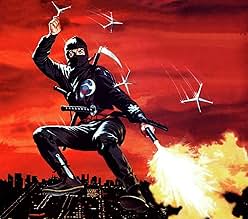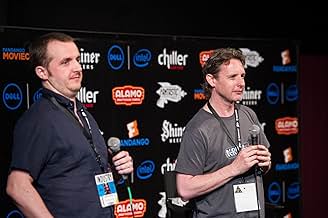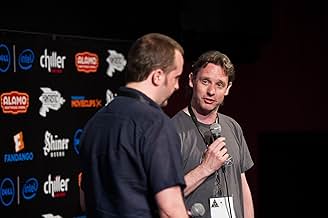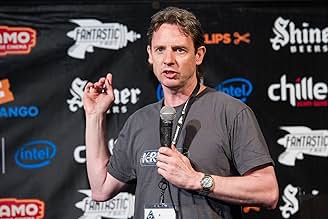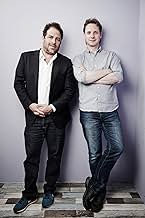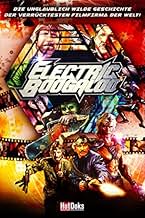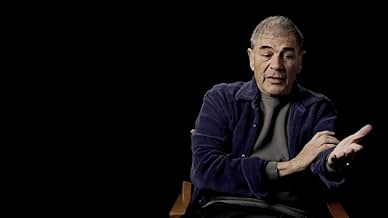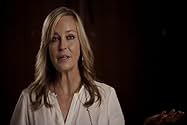A História nunca contada da Cannon Films
Título original: Electric Boogaloo: The Wild, Untold Story of Cannon Films
AVALIAÇÃO DA IMDb
7,4/10
6,2 mil
SUA AVALIAÇÃO
Adicionar um enredo no seu idiomaThe history of the independent film company, The Cannon Film Group, Inc.The history of the independent film company, The Cannon Film Group, Inc.The history of the independent film company, The Cannon Film Group, Inc.
Menahem Golan
- Self - Cannon Chairman
- (cenas de arquivo)
Itzik Kol
- Self - Production Executive
- (cenas de arquivo)
Roni Ya'ackov
- Self - Production Executive
- (as Rony Yakov)
Yftach Katzur
- Self - Actor
- (as Yiftach Katzur)
Enredo
Você sabia?
- CuriosidadesMichael Winner was going to be interviewed for the documentary, but he died before production started on it.
- Citações
Roni Ya'ackov: She said, "Menahem, I can't do it. I'm dying." He said, "Do it... then die!"
- ConexõesEdited from Omnibus: The Last Moguls (1986)
Avaliação em destaque
In Tim Burton's Ed Wood, a cheapshot movie producer snorts at Ed's desire to create art on a shoestring. The irony is, of course, that however artistically credible he imagined himself, Ed Wood made junk anyway. There's a sweet spot where good intentions, lack of talent, and thriftiness meet, and Cannon Films regularly found it. The Asylum's mockbusters might be keeping the bad movie dream alive, but can you imagine a modern mini-studio greenlighting the likes of Superman, alongside Death Wish, alongside Shakespeare?
Cannon was set up in the 1960s but rose to prominence/notoriety in 1980 when it was sold to Israeli cousins Yoram Globus (the money man) Menahem Golan (the would-be moviemaker). This is where Mark Hartley's breakneck documentary joins the sordid story. Talking heads – directors, editors, and actors – provide snappy anecdotes and bitesized insights into the passion and incompetence of two upstarts who, for a time, upset the Hollywood establishment. And then spent $25m on an arm-wrestling movie.
Though remembered for Chuck Norris nonsense and some seriously ropey fantasy and sci-fi (Tobe Hooper's Lifeforce will make you question the value of cinema), at their peak Cannon were bashing out nearly 50 films a year. This left room for 'proper' movies from the likes of Franco Zeffirelli and Godfrey Reggio; Cannon even bagged an Oscar for Best Foreign Film at their mid-eighties peak. But for every Company of Wolves or Barfly there were five Charles Bronson Z-movies, so Cannon will always be remembered for the balderdash, churned out chiefly to take advantage of the burgeoning home video market.
Indeed, this is the perfect Eighties trash story, beginning with The Happy Hooker, the strangely apt story of a European prostitute coming to the US and sticking two fingers up to the Hollywood elite. The party ended with Cyborg in 1989, a Van Damme oddity which has little to do with cyborgs and whose creative failure rests partly on the shoulders of Albert Pyun, who would later find cinema's comic book nadir with his mouth-dryingly terrible Captain America. Cyborg was built with bits of Masters of the Universe, which gives us a clue as to the state of Cannon's finances at the turn of the decade. A brief 90s relaunch provided nothing of interest.
Perhaps there's a three-hour version of this documentary which delves into more depth and supposition about the essential culture clash that meant Globus and Golan failed spectacularly, time and time again, to grasp the mood of the nation they adored. But then the film would lose its briskness and humour, and Hartley's superb Uzi-editing would go to waste. It's a shallow documentary about men with shallow dreams, and it's enthralling for it.
The only real art to emerge from Cannon were exceptions that proved the rule. That rule being: Make 'em quick and make 'em cheap. By the time the bloated excess of Masters of the Universe was vomited into the multiplex (I recall that particular disappointment sorely) audiences expected more. Hartley's film may ultimately overstate the influence of Cannon – although with a new Terminator movie potentially about to join Jurassic World, Avengers, and Furious 7 at the top of the year's box office, the business model that spawned five Death Wishes and three Delta Forces does seem disturbingly prescient.
Cannon was set up in the 1960s but rose to prominence/notoriety in 1980 when it was sold to Israeli cousins Yoram Globus (the money man) Menahem Golan (the would-be moviemaker). This is where Mark Hartley's breakneck documentary joins the sordid story. Talking heads – directors, editors, and actors – provide snappy anecdotes and bitesized insights into the passion and incompetence of two upstarts who, for a time, upset the Hollywood establishment. And then spent $25m on an arm-wrestling movie.
Though remembered for Chuck Norris nonsense and some seriously ropey fantasy and sci-fi (Tobe Hooper's Lifeforce will make you question the value of cinema), at their peak Cannon were bashing out nearly 50 films a year. This left room for 'proper' movies from the likes of Franco Zeffirelli and Godfrey Reggio; Cannon even bagged an Oscar for Best Foreign Film at their mid-eighties peak. But for every Company of Wolves or Barfly there were five Charles Bronson Z-movies, so Cannon will always be remembered for the balderdash, churned out chiefly to take advantage of the burgeoning home video market.
Indeed, this is the perfect Eighties trash story, beginning with The Happy Hooker, the strangely apt story of a European prostitute coming to the US and sticking two fingers up to the Hollywood elite. The party ended with Cyborg in 1989, a Van Damme oddity which has little to do with cyborgs and whose creative failure rests partly on the shoulders of Albert Pyun, who would later find cinema's comic book nadir with his mouth-dryingly terrible Captain America. Cyborg was built with bits of Masters of the Universe, which gives us a clue as to the state of Cannon's finances at the turn of the decade. A brief 90s relaunch provided nothing of interest.
Perhaps there's a three-hour version of this documentary which delves into more depth and supposition about the essential culture clash that meant Globus and Golan failed spectacularly, time and time again, to grasp the mood of the nation they adored. But then the film would lose its briskness and humour, and Hartley's superb Uzi-editing would go to waste. It's a shallow documentary about men with shallow dreams, and it's enthralling for it.
The only real art to emerge from Cannon were exceptions that proved the rule. That rule being: Make 'em quick and make 'em cheap. By the time the bloated excess of Masters of the Universe was vomited into the multiplex (I recall that particular disappointment sorely) audiences expected more. Hartley's film may ultimately overstate the influence of Cannon – although with a new Terminator movie potentially about to join Jurassic World, Avengers, and Furious 7 at the top of the year's box office, the business model that spawned five Death Wishes and three Delta Forces does seem disturbingly prescient.
- rooee
- 30 de jun. de 2015
- Link permanente
Principais escolhas
Faça login para avaliar e ver a lista de recomendações personalizadas
- How long is Electric Boogaloo: The Wild, Untold Story of Cannon Films?Fornecido pela Alexa
Detalhes
- Data de lançamento
- Países de origem
- Central de atendimento oficial
- Idioma
- Também conhecido como
- Electric Boogaloo: The Wild, Untold Story of Cannon Films
- Empresas de produção
- Consulte mais créditos da empresa na IMDbPro
Bilheteria
- Faturamento bruto mundial
- US$ 864
- Tempo de duração1 hora 46 minutos
- Cor
- Proporção
- 1.78 : 1
Contribua para esta página
Sugerir uma alteração ou adicionar conteúdo ausente

Principal brecha
By what name was A História nunca contada da Cannon Films (2014) officially released in India in English?
Responda

